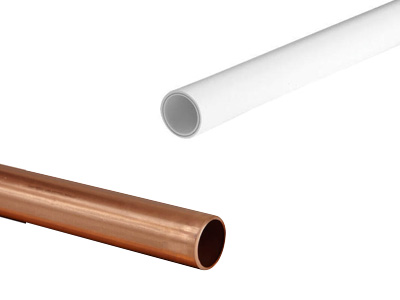
Copper Vs Plastic Pipes – Which is the better option?
Deciding between the use of copper or plastic pipes for a build in an important decision to make. Swapping pipe materials mid build could lead to wasted money and time as you would need to purchase multiple parts and adaptors for the various piping materials. It is therefore incredibly important to decide on which material to use before beginning.
Copper is the traditional material used for plumbing pipes, offering plumbers the flexibility of swapping out parts and was the highly popular choice when it came to pipe insulation. While it has had a lot of time as the marketing leading plumbing installation, is it still the best option for you?
THE PROS
Plastic pipes are growing in popularity due to numerous factors, namely their flexibility and cheaper price. While there are generalisations that can be made across different plastic materials for the sake of this article we will be focusing on PVC, one of the more commonly used materials for plastic piping.
THE PROS
THE CONS
Deciding between the use of copper or plastic pipes for a build in an important decision to make. Swapping pipe materials mid build could lead to wasted money and time as you would need to purchase multiple parts and adaptors for the various piping materials. It is therefore incredibly important to decide on which material to use before beginning.
Copper is the traditional material used for plumbing pipes, offering plumbers the flexibility of swapping out parts and was the highly popular choice when it came to pipe insulation. While it has had a lot of time as the marketing leading plumbing installation, is it still the best option for you?
THE PROS
- Durable, copper can last a long time
- Copper can handle heat without losing structural integrity
- Copper resists corrosion and high water pressure
- Copper is more easily usable outdoors
- Copper has a long history of durability and long-term usage
- Copper can be more expensive and less flexible than their plastic alternative
- If not treated with filtering, tap water may taste metallic
- Not resistant to sweating (insulation)
- Pipes can burst if water freezes internally
Plastic pipes are growing in popularity due to numerous factors, namely their flexibility and cheaper price. While there are generalisations that can be made across different plastic materials for the sake of this article we will be focusing on PVC, one of the more commonly used materials for plastic piping.
THE PROS
- PVC is resistant to many acids and halogens
- PVC can carry hot water if a skilled plumber chooses the correct material
- Simple and faster install options
- Cheap/Lower price point than copper
- Low noise emission and faster water flow
- Very little temperature conduction
THE CONS
- Not resistant to solvent
- Choosing the correct PVC pipes for hot water may be tricky to ensure longevity of the pipe
- Vulnerable to expansion and shrinkage pending the temperature of the liquids
- Shorter pipe life
- Weaker material (may need additional support)
- Not ideal for outdoor use (UV light can damage plastic pipes)
- If using under floorboards it may be vulnerable to damage by rodents
